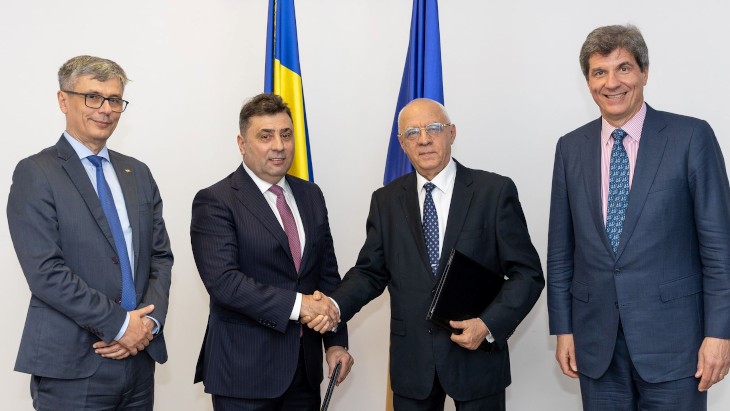RoPower's initial project is the repowering of the Doicești coal plant which lies in a valley in the foothills of the Transylvanian Alps about 90 kilometres northwest of Bucharest. As a VOYGR-6 nuclear power plant, Doicești will feature six power modules supplied by US firm NuScale for a generating capacity of 462 MWe.
A further 77 MWe of renewable generation could also be added, which would take the capacity of the repowered plant beyond what was ever produced there before with fossil fuels and provide "a new vision of generation sources for the national energy system of the future".
The joint venture partners with 50% stakes in RoPower Nuclear are state-owned Nuclearelectrica and private power company Nova Power & Gas, which is part of the E-Infra group that owns the Doicești site. A shareholders' declaration was made at a signing ceremony on 27 September, with energy minister Virgil Popescu and US Under Secretary for Economic Development, Energy and Environment Jose Fernandez as guests of honour.
Popescu said: "The project is an example of the successful relations between Romania and the USA in the field of nuclear energy, which bring many benefits, in particular, economic stability and energy security", adding that "the government of Romania supports this important project."
The partners said that the RoPower Nuclear will generate more than 200 permanent jobs at the power plant, 1500 jobs in construction, 2300 jobs in production and will help Romania avoid more than 4 million tonnes of carbon dioxide emissions per year, while also providing socio-economic benefits to the communities near Doicești.
The partnership between the USA and Romania on small reactors began in March 2019 with a Memorandum of Understanding between Nuclearelectrica and NuScale to study potential developments. This was followed in 2020 by an intergovernmental agreement between Romania and the USA and an expression of interest from the US Exim Bank to provide support of up to USD7 billion. Doicești was selected for closer investigation in May this year after a USD1.2 million study, and a USD14 million preliminary engineering and initial design has since been carried out. The site selection process has also been reviewed by the International Atomic Energy Agency.





_730_93825.jpg)

_83147.jpg)
_87299.jpg)






